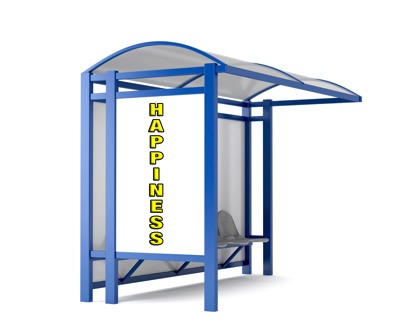Happy Endings

The Grasshopper offered this up a few days ago: “If you’re married to happy endings, you’re destined for divorce.”
On first blush it appears as a statement of resignation, but after reflecting on it for awhile, I find it to be a message of managing reality.
A happy ending may be the goal but happy has never been, nor ever will be, a permanent state. It comes and goes. When it’s here, it’s to be celebrated and enjoyed. When it’s gone, it’s productive to create the environment for its return.
Think of happiness that goes away as a bus that we got off of at the wrong stop. We can fret over our misfortune and get burdened with our angst, but the reality is another bus will come along.
Trying to capture happiness in a jar is like catching a firefly. Eventually its light will go out.
I think we spend too much time focused on how we can keep happiness in place rather than immersing ourselves in it while it’s here. We spend our moments attempting to catch lightning bugs in a jar rather than enjoy the light they bring while they’re present.
You set yourself up for disappointment by attempting to be perpetually happy. No one is and if they tell you they are, be prepared for them to try and sell you the “amazing” formula (think snake oil).
Creating the environment for happiness is having an optimistic mindset. That means to recognize there is a part of us that trusts the bus is coming again and that we’ll hop on when it comes to our stop.
Warning: If something specific has to be in place for you to be happy, you may never see that bus again. “I’ll be happy when (fill in the blank).” That’s a blank check that only buys unhappiness.
For me, it feels better to be happy than sad but life has taught me that both of these states are life-long visitors. The trick is to notice the temporary nature of each and expect the less desired one to go away soon and the more coveted one to come around again.
It’s kind of like my mother said, “If you’re mad, you’ll get glad again.”
All the best,
John
Be Sociable, Share!

 Here’s something we all have in common: We react.
Here’s something we all have in common: We react. Call me late to the party but the duality of the word “reason” just dawned on me.
Call me late to the party but the duality of the word “reason” just dawned on me. When your football team is expected to win and they don’t, that’s an upset. But how many other things do we get upset about before they even happen?
When your football team is expected to win and they don’t, that’s an upset. But how many other things do we get upset about before they even happen? The Grasshopper asked a probing question this morning: “Are you looking for a solution or a sounding board?”
The Grasshopper asked a probing question this morning: “Are you looking for a solution or a sounding board?” I ran across this old posting that has just as much pop today as it did 10 years ago.
I ran across this old posting that has just as much pop today as it did 10 years ago. The Grasshopper arrived with yesterday’s blizzard and dumped this on me:
The Grasshopper arrived with yesterday’s blizzard and dumped this on me: Here’s a New Year’s remembrance from many New Years ago:
Here’s a New Year’s remembrance from many New Years ago:  As we head into a new year, let’s reflect on what a wise, old man once said.
As we head into a new year, let’s reflect on what a wise, old man once said.